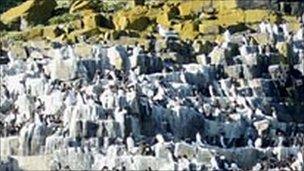Scotland's seabird numbers stabilising
- Published

The report found that seabird numbers have stabilised since 2007
A new report has revealed that Scotland's seabird numbers appear to be levelling off, after a period of decline since 2000.
The Scottish Natural Heritage (SNH) report found that between 1986 and 2009 the number of seabirds in Scotland had fluctuated, but declined overall by 28%.
The study confirmed that overall numbers may have stabilised since 2007.
The decrease was likely to be due to food shortage and weather conditions.
Other causes were predation by non-native species such as brown rats and mink.
According to the report, another likely major cause was a drop in the number of small fish, such as sand eels, which are an important food source for many seabirds.
The report stated that fish are probably being affected by rising sea temperatures because of climate change, as well as other factors.
SNH said intensive trapping and removal of non-native predators, such as the brown rat and the American mink, had also been carried out on parts of the Scottish coastline and islands and was now starting to show some benefits, with terns recolonising some areas.
The Scottish government's recent Marine Bill also included measures to improve marine nature conservation to safeguard and protect Scotland's unique habitats.
Andy Douse, SNH ornithologist, said: "The apparent halt of the decline since 2007 is encouraging.
"This may be an early sign that the various measures, and a lot of effort from many different people and groups across Scotland, have made a difference to seabird populations which are possibly beginning to stabilise.
"However, it is too early to say for sure that seabird numbers have stopped declining.
"Some sites in Scotland, particularly in the Northern Isles and some east coast colonies, have continued to decline.
"The data from the next few years will help us to better understand the changes."
Scotland's seabirds are internationally important, with about four million breeding seabirds of 24 species.
- Published28 July 2010